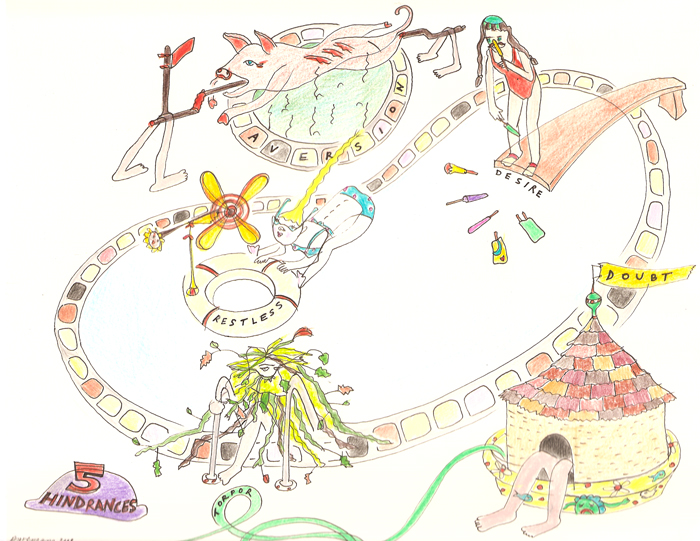
Hi Kate Moss!
I hear you’re converting to Buddhism! I’m not sure what “converting” means, but that’s cool. Welcome. I think your designs for Topshop are nice. Maybe you could get Johnny Depp to come to some dharma classes? Oh you guys are divorced. Sorry. Whew! I’m out of the whole celebrity-coupledom loop. I heard you bought a nice statue of Siddhartha. Je suis jalouse! (That’s French for I’m jealous – you probably already knew that. I’ve got a Buddha but it’s one of those fake fat little Chinatown Buddha’s. I hear yours is 4 feet 2 inches tall! Sweet.) Anyway, word has it you’re getting into Buddhism in order to de-stress. Friends have told you that you’re over-partying, ruining your looks etc. First of all – you look great. But also, I understand – nothing makes me drink one too many like stress. Seriously, the less I worry, the less I need to party. And the less I party – the less I worry. Don’t get me wrong I still party. And worry. But really, much less. And I volunteer, which I never did before. So.
Kate Moss, I think this could be a good fit. And to welcome you into the fold, I thought I’d share some tips that might help with your first six months of study. Now I am no Buddhist teacher (far from it), but I have an advantage of having started meditating and studying Buddhism recently and therefore I remember fairly clearly what did and didn’t work. So without further adieu, I present to you, and the rest of the burgeoning dharmic community, my completely unauthorized, subjective and possibly inacurrate top ten recommendations for those beginning Buddhist months:
1. Make sitting to meditate your number one priority. Above everything else. While I was starting out, I said to myself, “Self. You have one thing to do today and that is to meditate. If you succeed at sitting and watching your breath for ten minutes or more, you have succeeded for the day.” It helped.
2. No neurosis about meditating. If you’re following the breath, trust that you’re doing it right. Once you do longer sittings you’ll have revelations about your mental state and how you’re cheating the process – but now is the time for you to get comfy.
3. Listen to podcasts. There is an endless and inexhaustible supply of free podcasts on the internet. You can get acquainted with different schools of Buddhism and hear talks by the most famous and revered Buddhist teachers in the world. Search Itunes or Google. I like Zencast, Buddhist Geeks and, of course, the ID Project podcasts.
4. Once you’ve got your courage up (it took me forever), attend a dharma gathering. Meditating around other people is powerful and focusing. Seeing the variety of folks interested in Buddhism is inspiring. And of course it’s a different experience hearing a talk in person. That said …
5. While attending a dharma gathering – don’t take notes. This may be controversial – but I say especially if you are starting out – just listen. The need to be present trumps need to accumulate information. Similarly –
6. Don’t worry about names or terms! Pema, Trungpa, Nagarjuna, Dzingar, Kense, Richi, Theravada, bodhisattva, Mahayana – let it go. It’s a long life, and if you stay with Buddhism, eventually you will hear these names so many times you will say them in your sleep and wonder why you can’t talk right to anyone. One more point about gatherings:
7. People at dharma gatherings are annoying. They talk too long, make dumb jokes and they all have obvious personal agendas. This never changes and is an important part of practice and learning to let go.
8. Read dharma books. There are millions. One at a time and take it slow – but check in with a book for a few pages a day.
9. Do less. In general. The greatest hindrance to my practice is invariably the amount of actual physical time I have. Not mental spaciousness, physical time. Take out the cramming and the multi-tasking.
10. Enjoy! The first few months of Buddhism are like falling in love. But, just as the honeymoon period ends with every relationship, so does the mindfulness high. Appreciate it, respect it and don’t be surprised when it changes.
Kate Moss, I hope you stay on the path – it is challenging yet rewarding, and in the end I think it ups the quality and meaning in life. Maybe some people from this interdependent community I belong to have other tips for the nascent practitioner. I will resist making any puns on the “latest fashion” that is Buddhism and send you off to the exciting wilds of your mental formations.
Gros Bisoux (that’s French for Big Kisses – but you probably already knew that),
Julia May

